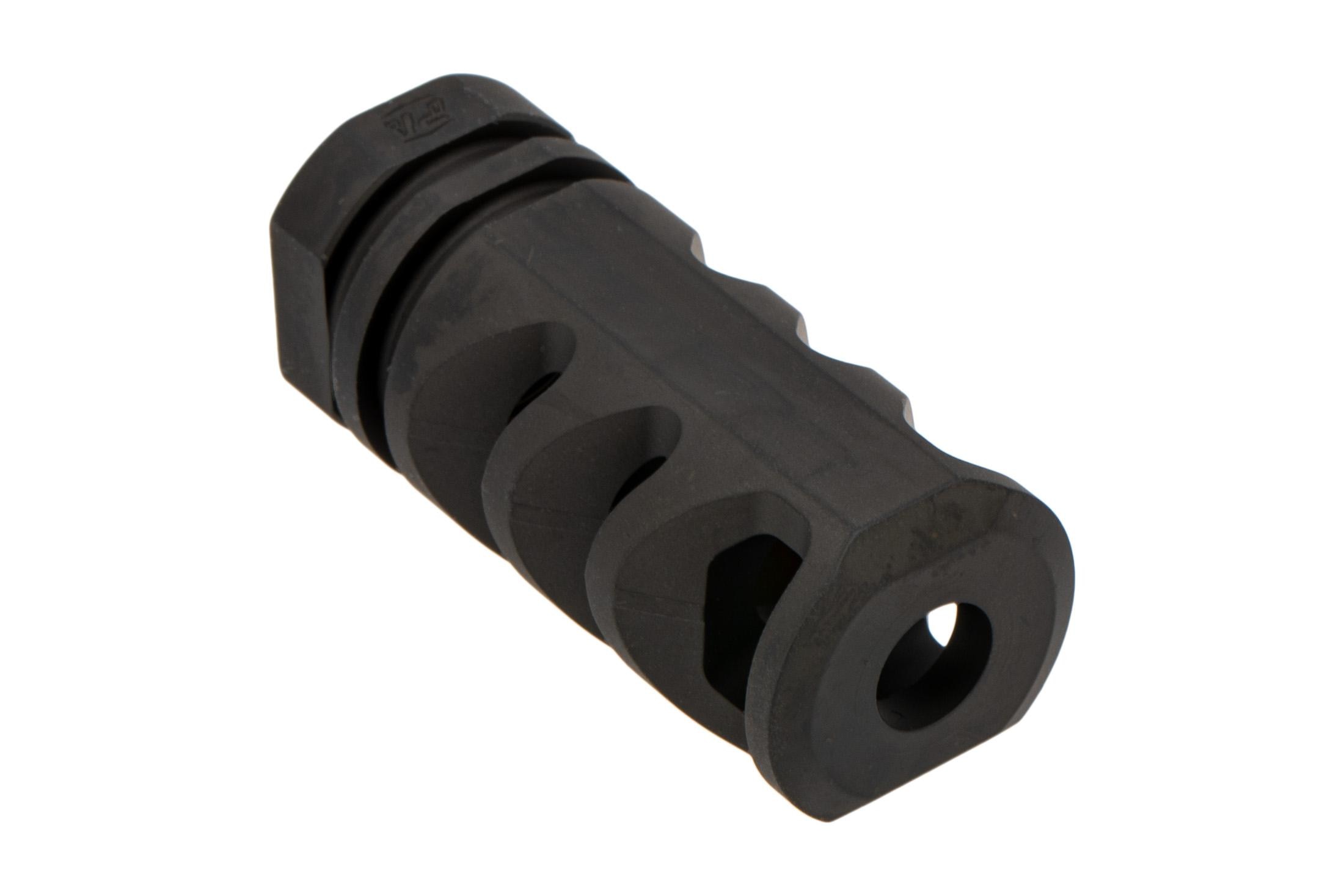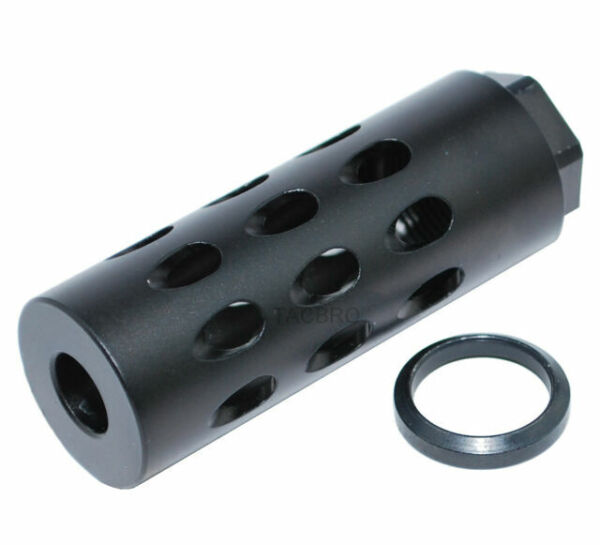When it comes to firearms accessories, the debate over muzzle brake vs compensator has been raging for years. Both devices are designed to enhance shooting performance, but they serve different purposes and offer distinct advantages. If you're a gun enthusiast or someone looking to upgrade their firearm, understanding the differences between these two attachments is crucial. So, buckle up because we're diving deep into the world of muzzle devices!
Picture this: you're at the range, and your buddy's gun seems to have way less recoil than yours. Or maybe you notice another shooter's rifle barely moves when fired. What's their secret? Chances are, they're using either a muzzle brake or a compensator. But here's the thing—choosing the right one depends on your specific needs and shooting style.
In this article, we'll break down everything you need to know about muzzle brakes and compensators, from their functions to their pros and cons. By the end of it, you'll be equipped with enough knowledge to make an informed decision. Let's get started!
Read also:Who Is Josh Duhamel Unveiling The Charismatic Hollywood Heartthrob
Table of Contents
- Introduction to Muzzle Devices
- What is a Muzzle Brake?
- What is a Compensator?
- Key Differences Between Muzzle Brake vs Compensator
- How to Choose Between Them
- Impact on Shooting Performance
- Noise and Backblast Considerations
- Legal and Regulatory Issues
- Maintenance Tips
- Final Thoughts
Introduction to Muzzle Devices
Before we dive into the specifics of muzzle brake vs compensator, let's take a moment to understand what muzzle devices are all about. These attachments are designed to modify the behavior of the gases that escape from the muzzle after firing. By controlling these gases, they can reduce recoil, improve stability, and enhance overall shooting experience.
Muzzle devices come in various forms, but the two most popular ones are muzzle brakes and compensators. While both aim to improve shooting performance, they do so in different ways. A muzzle brake primarily focuses on reducing recoil, while a compensator is all about minimizing muzzle rise. Let's explore each one in detail.
What is a Muzzle Brake?
A muzzle brake is a device that redirects propellant gases to counteract recoil and muzzle rise. It's like having a built-in shock absorber for your firearm. By redirecting the gases backward, it creates a counterforce that reduces the backward movement of the gun when fired.
How Does a Muzzle Brake Work?
Imagine firing a round. As the bullet exits the barrel, high-pressure gases follow it out. A muzzle brake has ports or vents that direct these gases backward, creating a force that opposes the recoil. This results in a noticeable reduction in felt recoil, making it easier to control the firearm, especially during rapid-fire sequences.
Here’s a quick rundown of its benefits:
- Significantly reduces recoil, allowing for faster follow-up shots.
- Improves accuracy by helping the shooter maintain better control.
- Ideal for heavy-caliber firearms where recoil can be intense.
What is a Compensator?
A compensator, on the other hand, is designed to reduce muzzle rise. When you fire a gun, the muzzle tends to rise upward due to the forces involved. A compensator combats this by redirecting gases upward, creating a downward force that keeps the muzzle steady.
Read also:Steve Irwin Stingray Accident The Untold Story Behind The Tragic Event
How Does a Compensator Work?
Think of a compensator as a stabilizer for your firearm. Its ports are strategically placed to redirect gases upward, which helps keep the muzzle pointed where you want it. This is especially useful for fast-paced shooting scenarios where maintaining sight alignment is critical.
Here’s what a compensator brings to the table:
- Reduces muzzle rise, allowing for quicker target reacquisition.
- Enhances accuracy by keeping the firearm level during firing.
- Ideal for lighter-caliber firearms where recoil isn’t as significant.
Key Differences Between Muzzle Brake vs Compensator
Now that we’ve covered the basics, let’s talk about the key differences between these two devices. While both are muzzle devices, they serve different purposes and have distinct characteristics. Here’s a breakdown:
Recoil Management
A muzzle brake is the clear winner when it comes to recoil reduction. If you’re dealing with heavy-caliber firearms or high-recoil setups, a muzzle brake will make your life easier. However, it comes with a trade-off: increased backblast and noise.
Muzzle Rise Control
When it comes to minimizing muzzle rise, compensators take the crown. They’re perfect for scenarios where quick follow-up shots are essential, such as competitive shooting or tactical situations. But they don’t offer the same level of recoil reduction as a muzzle brake.
Noise and Backblast
This is where things get interesting. Muzzle brakes tend to produce more noise and backblast, which can be uncomfortable for the shooter and anyone nearby. Compensators, on the other hand, are generally quieter and produce less backblast, making them more user-friendly in certain environments.
How to Choose Between Them
Choosing between a muzzle brake and a compensator depends on your specific needs and shooting preferences. Here are some factors to consider:
Your Firearm
Consider the type of firearm you’re using. Heavy-caliber rifles often benefit from a muzzle brake due to their significant recoil. Lighter-caliber firearms, on the other hand, may perform better with a compensator.
Your Shooting Style
Think about how you plan to use your firearm. If you’re into precision shooting or hunting, a muzzle brake might be the way to go. For competitive shooting or tactical applications, a compensator could be more suitable.
Environmental Factors
Don’t forget about the environment you’ll be shooting in. If noise and backblast are concerns, a compensator might be the better choice. In open areas where noise isn’t as much of an issue, a muzzle brake could work just fine.
Impact on Shooting Performance
Both muzzle brakes and compensators can significantly enhance your shooting performance, but they do so in different ways. A muzzle brake allows for better control over recoil, which is crucial for maintaining accuracy during rapid-fire sequences. A compensator, on the other hand, helps keep the muzzle steady, making it easier to reacquire targets quickly.
Studies have shown that shooters using muzzle devices can achieve up to a 30% improvement in accuracy and consistency. Whether you’re a seasoned marksman or a beginner, the right muzzle device can make a world of difference.
Noise and Backblast Considerations
Noise and backblast are two important factors to consider when choosing between a muzzle brake and a compensator. Muzzle brakes tend to be louder and produce more backblast, which can be uncomfortable for the shooter and bystanders. Compensators, while not completely silent, are generally quieter and produce less backblast.
If you plan to shoot in enclosed spaces or with others nearby, a compensator might be the better option. However, if you’re shooting in open areas where noise isn’t as much of an issue, a muzzle brake could work just fine.
Legal and Regulatory Issues
Before you make a decision, it’s important to check the legal and regulatory requirements in your area. Some regions have restrictions on muzzle devices, especially those that affect noise levels. Make sure you’re in compliance with local laws to avoid any potential issues.
Additionally, some shooting ranges may have their own rules regarding muzzle devices. It’s always a good idea to check with the range master before heading out to shoot.
Maintenance Tips
Proper maintenance is key to ensuring your muzzle device performs optimally. Here are a few tips to keep in mind:
- Clean your muzzle device regularly to prevent carbon buildup.
- Inspect it for signs of wear and tear, and replace it if necessary.
- Use high-quality lubricants to keep it functioning smoothly.
By taking care of your muzzle device, you’ll ensure it lasts longer and continues to perform as expected.
Final Thoughts
So, there you have it—a comprehensive look at the muzzle brake vs compensator debate. Both devices offer unique advantages and cater to different shooting needs. Whether you choose a muzzle brake for its recoil-reducing capabilities or a compensator for its muzzle rise control, the key is to select the one that best suits your requirements.
Remember, the right muzzle device can make a significant difference in your shooting performance. So, take your time, do your research, and make an informed decision. And don’t forget to share your thoughts in the comments below or check out our other articles for more firearm tips and tricks. Happy shooting!


